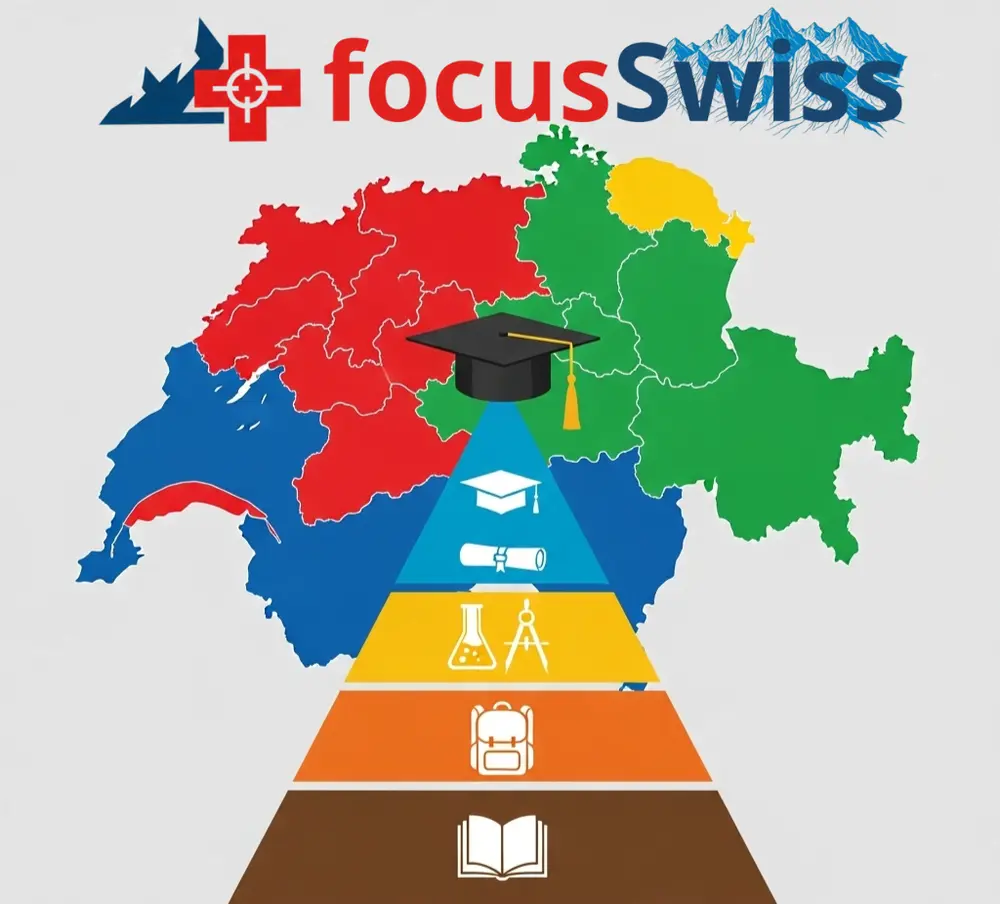The Swiss Education System
The Swiss education system, rather than being based on a centralized federal model, heavily relies on the principle of autonomy of the 26 cantons. This means there are significant differences between cantons regarding the duration of schooling, curricula, and even the school starting age. For families, understanding the system of their specific canton is the crucial first step.

The Swiss Education System
The Swiss education system, rather than being based on a centralized federal model, heavily relies on the principle of autonomy of the 26 cantons. This means there are significant differences between cantons regarding the duration of schooling, curricula, and even the school starting age. For families, understanding the system of their specific canton is the crucial first step.
The Fundamental Structure of Education: Three Main Levels
Education in Switzerland is fundamentally divided into three main levels:
Compulsory Education (Obligatorische Schulzeit)
This level covers the children’s basic schooling, including primary and lower secondary school. It is entirely free in state schools.
Secondary Level II (Sekundarstufe II)
This level begins after compulsory education and lasts 3 to 4 years. This stage determines young people’s transition to either professional life or higher education. It has two main tracks:
- Vocational Education and Training (Berufsbildung): Approximately 70% of students choose this path. The Dual System is applied, which combines practical training in companies (apprenticeships) with theoretical instruction at a vocational school.
- General Education (Gymnasium / Lycée): This is the academic track aimed at preparing students for university.
Tertiary Level (Tertiärstufe)
This stage follows vocational training or high school.
- Universities (Uni/ETH): Focused on academic and theoretical study.
- Universities of Applied Sciences (FH/HES/SUPSI): Provide practical, profession-oriented specialization.
Compulsory Education and the Critical Lower Secondary Separation
Compulsory education lasts approximately 9 to 11 years across all cantons, generally covering the age range of 4 to 16.
Start of Education
The compulsory school starting age varies between 4 and 6 years across the cantons. Most cantons require children to start kindergarten (Kindergarten / École enfantine) from the age of 4.
Early Separation (Lower Secondary – Sekundarstufe I)
One of the most characteristic aspects of the Swiss education system is the early separation of students, usually around 11–13 years old, based on their abilities. Students are directed to different schools or streams (levels) based on academic performance and teacher recommendations:
| School Type | Goal | Ideal For |
| Gymnasium (Traditional High School) | The highly academic track leading directly to university. | Students with excellent grades and strong abstract thinking skills. |
| Realschule / Sekundarschule (Vocational Track) | Preparation for vocational training (apprenticeships). | Students inclined toward practical skills and vocational aptitude. |
| Oberschule (Basic Level) | For students needing more support or with lower academic expectations. | Those needing a slower, more individualized learning pace. |
The system is officially permeable; well-performing students can transition to higher-level schools in subsequent years. However, many experts and parents criticize the early separation of students into vocational and academic tracks at the young age of 11–13. There is a widespread view that this early streaming limits children’s futures during a crucial exploration phase, and the system’s permeability mechanisms are often insufficient to compensate for this loss. This is often perceived as time taken from children’s developmental period in the name of early specialization.
Significant Differences Between Cantons
Although initiatives like the HarmoS Concordat aim to reduce the complexity arising from educational federalism, fundamental differences between cantons persist:
Summary of Cantonal Differences: Due to the autonomy of the cantons, the Swiss education system is not standardized. Specifically, the compulsory school starting age (between 4 and 6 years), the streaming model at the lower secondary level (Sekundarstufe I), and the grading systems vary significantly between cantons. These differences create the most critical adaptation challenges for families moving from one canton to another, as they directly impact the child’s grade level and curriculum. Therefore, reviewing the education brochure of the settled canton is vital.
School Language and Second Language
- Each canton provides education in its official language (German, French, or Italian).
- First Foreign Language: Begins in the first year of compulsory schooling (usually 3rd or 5th grade). Most German-speaking cantons first teach a Swiss national language (French or Italian), followed by English.
Kindergarten Duration and Structure
Kindergarten duration varies by canton. For example, in Zurich, kindergarten is compulsory for 2 years (age 4), while in Geneva, the first two years of primary school are at the kindergarten level (age 4).
Grading System
Grading systems may vary by canton, but the 6-point system is generally used. In this system, 6 represents the best grade (Excellent), 4 is the passing grade (Sufficient), and 3 and below represent a failure (Insufficient).
Universities of Applied Sciences (FH/HES/SUPSI)
These institutions, compared to traditional universities, offer practical specialization aimed directly at the needs of the job market.
Examples of Applied Specializations:
- Engineering and Architecture: Software Engineer, Electrical Engineer, Building Technology Specialist.
- Economics and Services: Business Economist, Controller, Tourism Manager.
- Health and Social Work: Nursing Specialist (Dipl. Pflegefachperson), Physiotherapist, Social Worker.
- Art and Design: Graphic Designer, Industrial Designer.
Language Support
Cantons usually offer the following support for students speaking foreign languages:
- Integration Classes (Integrationsklassen): Special classes providing intensive language support during the first year.
- Transition Support: Additional language lessons for a few hours a week while integrated into the regular class (DaZ – Deutsch als Zweitsprache or equivalents for other languages).
The True Strength of the System – Teacher Quality
While the general structure of the Swiss education system involves federal complexities, the true strength and quality of the system lie in the approach of the staff working on the ground. Based on long-term personal observations, teachers carry out their duties with great responsibility and do not leave any child to fend for themselves. The practice of teachers engaging in one-on-one communication with families, promptly and thoroughly reporting deficiencies, and arranging urgent meetings for children who have identified issues are the factors that perfect the quality of the education. This intensive and personal attention stands out as the most crucial factor in helping children find the right path in their education, despite systemic challenges like early separation.

